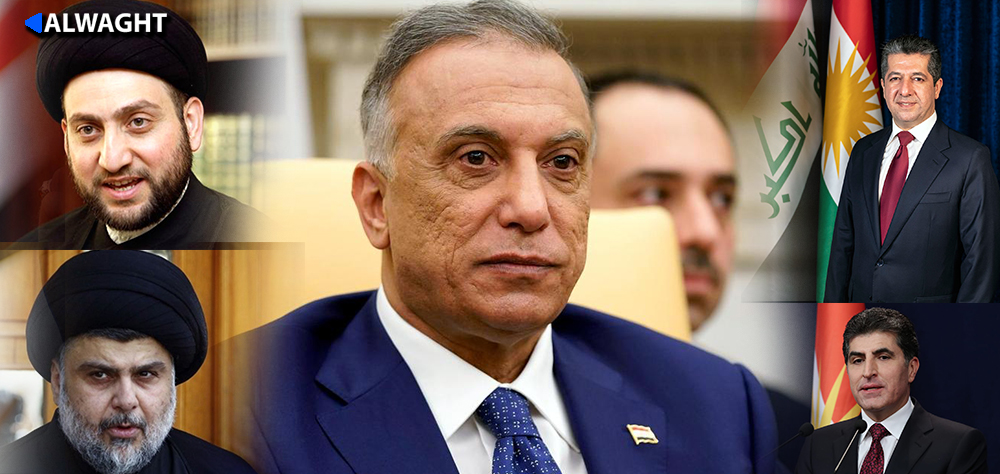Alwaght- Immediately after Pope’s visit to Iraq last week, Prime Minister Mustafa al-Kadhimi issued a statement calling for national dialogue including all groups and the opposition. Al-Kadhimi’s remarks met advocacy of political leaders, among them those of the National Wisdom Movement led by Sayyed Ammar Hakim, the Saeroon Coalition led by Sayyed Muqtada al-Sadr, and even Kurdish leaders like Kurdistan Regional Government's President Nechirvan Barzani and its PM Masrour Barzani.
But why has al-Kadhimi proposed such a plan in the current situation, and what capacities and limitations does this proposal have in its implementation?
A plan to move the country out of crises
At first glance, it may seem that the PM's call is an attempt to build unity in order for Iraq to move towards sustainable growth and development, but if we take a closer look at the political situation in Iraq, we understand that the al-Kadhimi’s proposal is meant to move out of crisis or at the minimum manage the political impasse the country is living.
In fact, today's Iraq, unlike in the early years after 2003, can no longer hide its political, economic, and social crises simply by saying it is in the transition period and that it needs to overcome the Baathist Party's remnants as troublemakers. In the current circumstances, the Iraqi society and public, perhaps more than ever - even more than during the Baathist regime - are pessimistic about the political management in the country, especially in the economic field, and want comprehensive reforms. This bears signs of Iraqi political history's entry to a new period whose constancy is essentially not only impossible but also inundated with wide-ranging crises.
It is important to note that in post-Saddam Iraq, the basis for coalition government between Shiites, Kurds and Sunnis was established because they played as three main pillars of power, and agreements outside parliament as the guiding path for the politics were accepted by the political factions.
With the passage of time and the increase of the experience of political parties in governance, Iraq gradually shifted to the priority of party, groups, and sects' interests and goals. This means that the Kurdish-Shiite-Sunni coalition is no longer easy to achieve, and some of these ethnic groups are moving in the direction of their sectarian demands, ignoring a necessary prioritization of the national interests.
But the tragedy of politics in Iraq does not end there as within each of these sects the power struggle is at the maximum; to the extent that now among the Shiites, Kurds and Sunnis, the political parties are not willing to accept each other's leadership. Even on a larger scale, the possibility of alliances among the political factions is now difficult and even impossible in some circumstances. These conditions in general seem to have pushed the PM to make a suggestion for national dialogue.
Proposal needs clear and right presentation
There is a great deal of consensus on the fact that al-Kadhimi's plan for national negotiations is the result of a crisis in the country's politics and governance. But the point now is that simply raising the issue of national negotiations cannot be the solution. Actually, it does not change the equations. Such proposals by other Iraqi prime ministers, especially Haidar al-Abadi and Adel Abdul-Mahdi, were presented, though in other forms, but the question now is how al-Kadhimi intends to raise and implement comprehensive national-level talks in today's Iraq.
It is necessary for the PM to clearly reveal the goals, details, scope, and the quantity of forces present in the negotiations and the level of actors involved in the proposed national negotiation plan, and to specify to public opinion and political factions what landscape he draws behind the proposal. Certainly, al-Kadhimi would not be able to hope for its implementation, until he can give a clear picture of his plan.
Capacities and limitations of the proposal
While there are capacities for it, al-Kadhimi’s proposal faces limitations in the course of implementation.
- Consensus among a majority of the political actors in the country on the need for reforms to the politics and governance structures.
- Support from influential political leaders like Hakim, al-Sadr, al-Abadi, al-Amiri, and the Barzanis to the dialogue. These figures can play a great role in a political success should they reach a consensus.
- Public support to the reformation of the political structure can give the negotiations the necessary support for start.
But beside the capacities, there are limitations to the proposal. Here are some of them:
- Deep and wide political gaps grew among the political parties in recent years. They now present a serious obstacle to any movement toward national talks.
- The suggestion is made while not a long time is left to the snap general elections, scheduled for October 16. At a height of 9 months, a comprehensive and widely agreed-upon agreement is hardly likely.



























